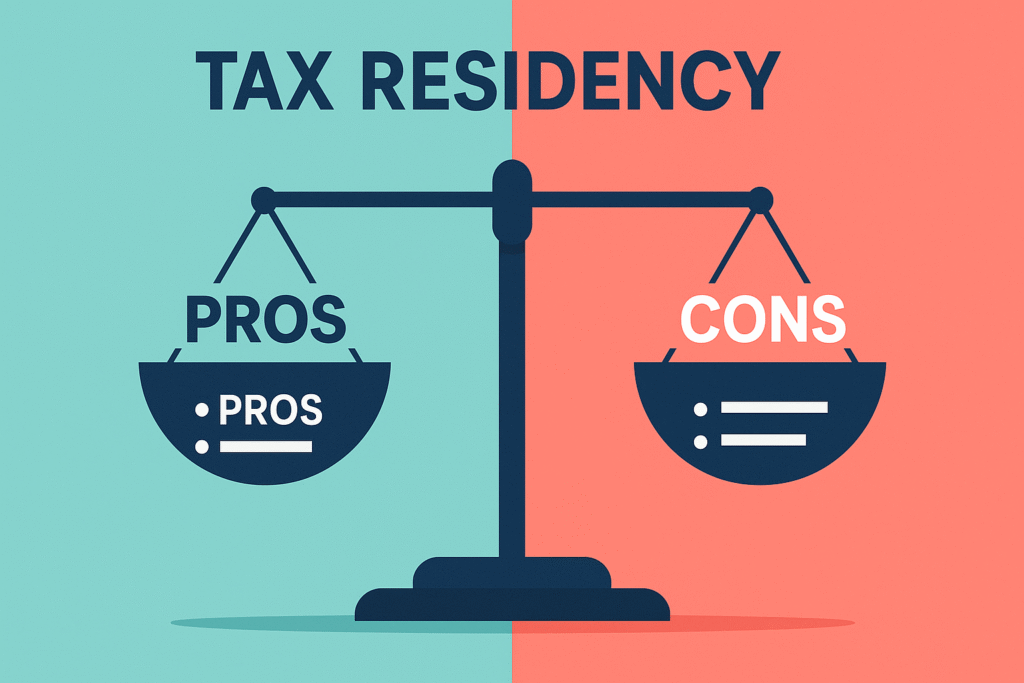Why Taxes for Digital Nomad Travelers Matter
The rise of remote work has spurred millions of professionals to take their jobs on the road. Digital nomads mix travel and employment, often living in countries like Brazil for months at a time. However, understanding taxes for digital nomad workers is just as important as booking flights and finding co‑working spaces. A digital nomad visa provides legal residency, but it also triggers tax obligations if you stay long enough to become a tax resident. Knowing whether and when you become subject to tax residency in Brazil helps avoid penalties and double taxation.
This article explains the 183‑day rule, local tax rates and filing requirements. It compares tax treatment under the digital nomad visa with that of tourists or short‑term visitors. The goal is to help North American and European readers enjoy Brazil while staying compliant and maximizing take‑home pay. We’ll also include currency conversions (BRL, USD, EUR) and practical tips for budgeting and compliance.

Understanding Taxes for Digital Nomad Workers
What Are Digital Nomad Taxes?
Many assume remote work abroad exempts them from local tax rules. In reality, taxes for digital nomad workers depend on residency status. If you remain under the 183‑day threshold in Brazil and earn all income abroad, you generally continue to pay tax in your home country. Brazil will not tax your foreign-sourced income. However, once you pass 183 days of physical presence within a 12‑month period you typically become a Brazilian tax resident. At that point, your global income may be subject to Brazilian income tax. This rule applies whether you hold a digital nomad visa or a tourist visa.
Income tax rates in Brazil are progressive, ranging from 7.5 % to 27.5 %. For example, monthly earnings up to R $2,112 (US$387 / €333) are exempt, while income between R $2,112 and R $2,826 (US$387–US$518 / €333–€450) is taxed at 7.5 %. The top rate of 27.5 % applies to monthly income above R $4,664 (US$855 / €735). Payroll social contributions also apply if you work for a Brazilian employer, but as a digital nomad employed abroad you usually avoid Brazilian payroll taxes and focus on income tax.
How the Digital Nomad Visa Affects Tax Residency in Brazil
The digital nomad visa (VITEM XIV) grants legal residence for up to a year, renewable once. It requires proof of remote work and a minimum monthly income of US$1,500 (≈R $8,206 / €1,291). Holding this visa by itself does not make you a tax resident. Instead, tax residency is tied to physical presence. Under Brazilian law, once you stay in the country for more than 183 days in any 12‑month period, you become a tax resident and must report your worldwide income in Brazil. This rule also applies to temporary or permanent visas and even to tourist visas if your stay is long enough.
The key difference is that digital nomad visa holders often plan longer stays. Because the visa allows a one‑year residence, many nomads pass the 183‑day threshold and therefore trigger tax residency in Brazil. Knowing this helps you plan trips out of the country to reset the residency clock or decide to register as a tax resident to benefit from local services.

Determining Tax Residency in Brazil
The 183‑Day Rule Explained
Brazil’s tax code states that individuals become residents for tax purposes when they live in Brazil for more than 183 days within a 12‑month period. These days need not be consecutive; multiple trips that cumulatively exceed 183 days count. Days of arrival and departure are included. The 12‑month window is rolling, meaning you should track presence continuously. A common strategy for digital nomads is to exit Brazil before day 183 and spend time in another country. Upon leaving, your tax residency ends the day after departure, but days from the previous 12 months still count if you return. This makes careful planning essential.
Permanent and Temporary Visas vs. Tourist Stays
Permanent visa holders automatically become tax residents upon arrival. Temporary work visas (other than the digital nomad visa) also confer tax residency. Tourists and digital nomads are treated the same until they cross 183 days. Children and spouses included on a nomad’s visa share the visa holder’s tax status. If you bring dependents on a family reunification visa, they also become tax residents when the family passes the 183‑day mark.
Filing Tax Returns as a Digital Nomad
When to File
Tax residents must file an annual Brazilian income tax return (Declaração de Imposto de Renda). The tax year matches the calendar year. Returns are due in April of the following year. Even if you owe no tax, filing is mandatory once you become a resident. Non-residents are subject to withholding tax on Brazilian-source income only; they do not file annual returns for foreign income.
Reporting Worldwide Income
Brazilian tax residents must report global income. If your employer pays in U.S. dollars or euros, convert earnings to Brazilian Real using the exchange rate on the payment date. As of August 2025, the average rate was 1 USD = 5.47 BRL and 1 EUR = 6.36 BRL. For example, a software developer earning US$6,000 monthly would report approximately R $32,820. Deductions are allowed for certain expenses like social security contributions, alimony and dependents. Business expenses for freelancers may also be deductible if properly documented.
Social Security and Double Taxation Treaties
Brazil has agreements to avoid double taxation with about 30 countries, including France, Japan and Portugal, but notably not with the United States or Canada. These treaties prevent income from being taxed twice. If you live in a treaty country, you may claim credits in your home return for taxes paid in Brazil. For Americans and Canadians, no treaty means you must rely on foreign tax credit rules in your own country to offset Brazilian taxes.
Brazil also has a social security totalization agreement with the U.S. that allows American remote employees to avoid contributing to Brazilian social security if they continue paying U.S. FICA taxes. Canadians can similarly remain within Canada’s system. Without these agreements, employers must register with Brazil’s social security and contribute on behalf of their employees.
Tax Benefits and Deductions
Deductions for Dependents and Education
Digital nomad tax residents can deduct R $2,275 (US$410 / €364) per dependent from taxable income. Tuition fees for primary and secondary education of children are also deductible up to R $3,561 (US$641 / €569) per child. Health expenses paid for dependents—like medical insurance and doctor visits—are fully deductible. This helps families offset some of the tax burden.
Business Expense Deductions
Freelancers on a digital nomad visa who file under Brazil’s simplified tax system (Simples Nacional) may deduct business expenses such as equipment, software subscriptions and coworking memberships. These deductions reduce taxable income and therefore tax liability. Keeping receipts and invoices is crucial in case of audit.
Foreign Tax Credits
Brazil allows a credit for foreign taxes paid on the same income, limited to the amount of Brazilian tax due. For instance, if you paid €2,000 in German income taxes while working remotely from Brazil, you may deduct up to the equivalent Brazilian tax from your liability. This prevents double taxation but requires documentation of foreign tax payments.
Tax Residency in Brazil for Digital Nomad Visa Holders
Pros of Becoming a Tax Resident
- Access to Social Services: Residents can register for Brazil’s public health system (SUS) and public schools.
- Financial Inclusion: Tax residents can open savings and investment accounts at Brazilian banks, sometimes with better yields than foreign banks.
- Ease of Doing Business: Registering a local company becomes simpler, enabling entrepreneurial activities such as consulting or e‑commerce.
- Path to Permanent Residency: Long-term tax compliance and residency can count toward permanent residency or citizenship eligibility.
- Integration: Being a resident fosters deeper cultural immersion and may simplify rentals and long-term leases.
Cons of Becoming a Tax Resident
- Higher Tax Rates: Compared with no tax on foreign income, paying up to 27.5 % can be significant.
- Complex Compliance: Filing Brazilian returns in Portuguese with currency conversions requires additional effort or professional help.
- Reporting Requirements: Residents must declare foreign assets (above US$100,000 (≈R $547,000 / €93,750)) to the Central Bank annually.
- Estate and Gift Taxes: Brazil imposes inheritance and gift taxes (ITCMD) of 4 %–8 % at the state level.
- Potential Double Taxation: Without treaties, you rely on foreign tax credits, which can be complicated and sometimes insufficient.

Comparing Tax Obligations: Digital Nomad Visa vs. Tourist Stays
| Aspect | Digital Nomad Visa | Tourist (Short Stay) |
|---|---|---|
| Stay Duration | Up to 1 year, renewable once | Typically up to 90 days (or 180 days cumulatively) |
| Income Threshold | Must earn US$1,500/month (≈R $8,206 / €1,291) or hold US$18,000 in savings | No income requirement, but working remotely may be restricted |
| Tax Residency Trigger | Exceeds 183 days within 12 months | Same 183‑day rule; shorter stays rarely meet threshold |
| Tax Filing Required? | Yes, if resident; must file annual return | No, if non-resident; only Brazilian-source income taxed at 25 % withholding |
| Access to Deductions | Can deduct dependents, education, health expenses | Not applicable to non-residents |
| Ease of Exit | Must file “Declaração de Saída Definitiva” when leaving Brazil to avoid ongoing tax obligations | Simply depart before 183 days |
Short-term remote workers benefit from avoiding Brazilian income tax by staying under 183 days. However, they may still need to pay tax on Brazilian-source income at a flat rate of 25 %, which is withheld at source. Digital nomad visa holders have more time to explore and integrate but face more complex tax compliance.
Cross-Border Tax Planning Tips
Keep Careful Track of Days
A small spreadsheet or mobile app can record entry and exit dates. Remember that Brazil counts days of arrival and departure. If you plan multiple trips, track cumulative days across the 12‑month rolling period.
Use Multi‑Currency Accounts
Exchange rate fluctuations affect tax calculations and living costs. Consider using accounts like Wise or Revolut to hold BRL, USD and EUR. With August 2025 rates at 1 USD = 5.47 BRL and 1 EUR = 6.36 BRL, timing conversions can save money. For example, transferring €5,000 at 6.36 BRL/€ yields R $31,800.
Budget for Taxes and Social Contributions
If you plan to become a resident, set aside 20 %–30 % of your income for tax payments. Budgeting helps avoid surprises in April. Some digital nomads choose to register as micro-entrepreneurs (MEI), which simplifies filing and offers lower tax rates for annual income up to R $81,000 (US$14,810 / €12,740).
Consult an Accountant
Brazilian tax laws are complex and frequently updated. Working with a local accountant who speaks English helps you navigate tax filings, deductions and reporting obligations. Their fees typically range from R $1,000 to R $2,500 (US$185–US$460 / €170–€425) per year, depending on service level.
Leverage Double Taxation Agreements
If you are from France, Italy, Germany or Japan, double taxation treaties may provide relief. For example, the Brazil–Portugal treaty allows Portuguese residents to credit Brazilian taxes against Portuguese tax on the same income. U.S. citizens rely on the Foreign Tax Credit (FTC) or Foreign Earned Income Exclusion (FEIE), while Canadians use the foreign tax credit to offset Canadian taxes.
How to Exit Brazil and Avoid Continued Tax Liability
Final Exit Declaration (Declaração de Saída Definitiva)
If you decide to leave Brazil permanently or remain outside the country for more than 12 months, you must file a Final Exit Declaration with the Federal Revenue. This informs the tax authorities of your departure and ends your tax residency effective the day after leaving. Failure to file could result in continued tax obligations on global income. The declaration is usually due by the last business day in April of the year following departure.
Abandoning the Digital Nomad Visa Early
If you hold a digital nomad visa but decide not to renew after one year, you can simply leave before your permit expires. There is no exit tax for digital nomad visa holders, but the Final Exit Declaration is still required if you have become a tax resident. Keep all documentation (visa, residence card, tax returns) in case you reapply or need proof of compliance.
Frequently Asked Questions
Does the Digital Nomad Visa Guarantee Tax Exemption?
No. The digital nomad visa allows you to stay legally in Brazil but does not exempt you from income tax. You become a tax resident once you spend more than 183 days in a 12‑month period, regardless of visa type.
Can I Avoid Tax Residency by Taking Short Trips?
Yes. Many nomads limit stays to fewer than 183 days or leave the country before reaching that threshold. Remember that days accumulate across multiple trips. For example, three 60‑day visits within 12 months would cross the 183‑day line.
Will I Be Taxed Twice?
Without a tax treaty, you may owe tax in both Brazil and your home country. You can claim foreign tax credits in your home tax return to avoid double taxation. U.S. citizens may use the FEIE to exclude up to US$120,000 (≈R $658,000 / €103,670) of foreign earned income (2025 figure).
Do I Need to Pay State Taxes in Brazil?
Income tax is federal. States levy taxes on property transfers, inheritance and gifts. Municipalities charge service tax (ISS) on certain professional services performed within their territory, even by digital nomad freelancers. Rates typically range from 2 %–5 %.
What If My Employer Is Brazilian?
If you work for a Brazilian company, you are subject to payroll taxes and social contributions from day one. The employer must register you locally. In this case, you will be a tax resident immediately.
Conclusion: Navigating Taxes for Digital Nomad Visa Holder
Brazil’s welcoming climate, vibrant culture and relatively low cost of living make it an attractive destination for remote workers. However, the tax rules are nuanced. Holding a digital nomad visa offers stability and legal residence but can trigger tax residency in Brazil if you stay longer than 183 days. Planning your stay, understanding local tax brackets, and leveraging deductions can reduce your tax burden. If you stay shorter periods, you may avoid residency but should remain aware of withholding taxes on Brazilian earnings.
Ultimately, the smartest approach is to be informed. Track your days, consult a professional, and file returns on time. With proper planning, you can enjoy Brazil’s beaches, cities and jungles while complying with both your home and host country tax laws. Knowing the differences between tourist stays and digital nomad residence—and weighing the pros and cons of each tax regime—allows you to optimize your adventure while staying on the right side of the law.
References
- Brazilian National Immigration Council. Resolução Normativa nº 45/2021 – Digital Nomad Visa requirements and income thresholds: portaldeimigracao.mj.gov.br.
- Exchange-Rates.org. USD to BRL and EUR to BRL Rates (August 2025): exchange-rates.org
- Numbeo. Cost of Living in Rio de Janeiro: numbeo.com
- Timeanddate.com. Climate Averages for Rio de Janeiro: timeanddate.com.







Great write-up, I am regular visitor of one¦s blog, maintain up the nice operate, and It’s going to be a regular visitor for a lengthy time.